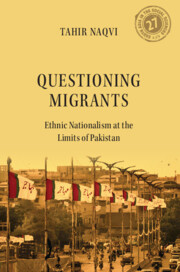Introduction
Published online by Cambridge University Press: 13 November 2024
Summary
The Muhajir Qaumi Movement (MQM) is a militant ethno-nationalist movement that achieved mass-democratic power in Pakistan during the 1980s. Propelled by ethnic riots and led by university students with lower-middle-class backgrounds, the MQM used a vigilant style of militancy to transform the cities of the southern Pakistani province of Sindh into an ethnic majoritarian stronghold – this, at the unlikely height of Pakistan's third military dictatorship (1978–1988). From the outset, leaders from the movement voiced long-standing concerns that Muhajirs – partition-era migrants from what is today India – had been systematically pushed out of public sector institutions by native Pakistanis (often referred to by activists in English as “sons of the soil”). The more novel aspect of the MQM's platform, however, was its demand for the recognition of Muhajirs as a separate, “oppressed nationality” (mazlum qaum) within Pakistan. This demand for an ethnic nationality and the displacement it enacts on both official and minority conceptions of the nation is the subject of this book.
Some sense of what is at stake in the displacements of Muhajir nationalism can be found in the story of its original leader, Altaf Hussain. Soon before the MQM achieved mass-political power, Hussain was arrested for burning the Pakistani flag on the steps of the mausoleum of Muhammad Ali Jinnah, the Muslim nation-state's “great founder and leader” (Quaid-e-Azam). A senior MQM activist's voice swelled with feeling as he recalled the ghostly encounter between the two leaders, which took place shortly after the military coup of 1978. The question of what Hussain was trying to convey that day on the steps of the mausoleum hung between us as we sat there, just slightly removed from the evening bustle of the party office. Sensing my apprehension, he turned in closer to break the silence: “After all, what else can a lover of Pakistan do when they don't receive rights?” (Akhir, jab haq nahi milta to mohib-e-vatan ko kiya karna chahiye?).
Further insight into the MQM's distinctive critique of the Pakistani nation-state can be found in Safar-e-Zindagi (My Life's Journey, 1988), Hussain's hastily written political biography published on the eve of Pakistan's return to civilian democratic rule in which he writes, “[T]he Mohajir [sic] nation had its beginnings (shuruat) in the Two-Nation Theory of Pakistani nationhood” (A. Hussain 2011 [1988]: 132), thereby framing the latter simultaneously as a point origin and departure.
- Type
- Chapter
- Information
- Questioning MigrantsEthnic Nationalism at the Limits of Pakistan, pp. 1 - 22Publisher: Cambridge University PressPrint publication year: 2025

